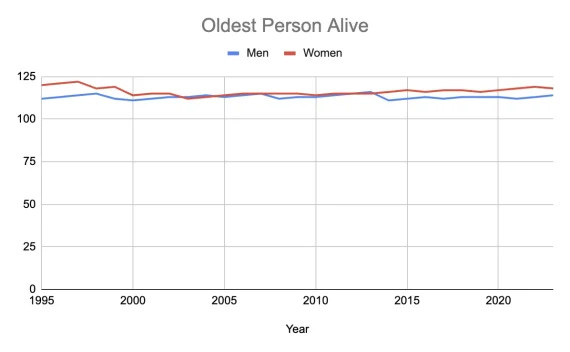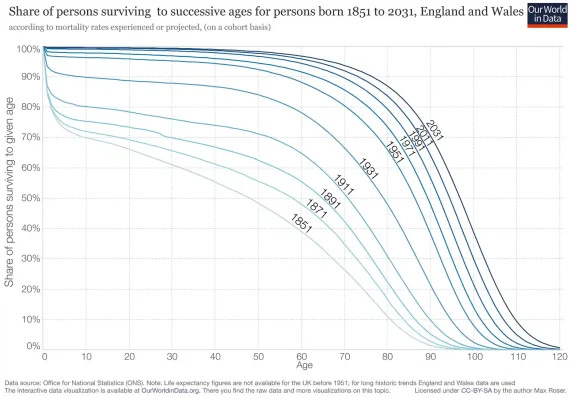The Limits of Human Lifespan
Realistic Expectations for Longevity
In 1997, Jeanne Calment, a Frenchwoman with a penchant for port and chocolate, passed away at the impressive age of 122 years. Her longevity led many to believe she heralded a trend of ever-increasing lifespan records. Optimistic projections showcased charts to demonstrate the rise in human lifespan over the years:
It's an impressive visual. The trend line spanning two centuries indicates an increase in life expectancy by 0.25 years annually. If this rate persisted, by the end of this century, the nation with the highest life expectancy might reach an average of 110 years!
However, when analyzing the age of the oldest living individual year-by-year for the past three decades, the improvement over time vanishes:
Contrary to expectations, there hasn't been a discernible increase in the maximum lifespan in recent decades. The eldest individuals' age seems to have declined slightly after three decades of medical advancements. Adding to the intrigue, doubts have arisen regarding Calment's age. The official narrative claims her daughter Yvonne died at 36, with Jeanne then raising Yvonne's son and living with Yvonne's husband. Given the extreme outlier of Calment's age, some have theorized Jeanne Calment is actually her daughter, Yvonne, who swapped her identity with her mother, possibly to evade inheritance taxes1.
The Greyness of Blue Zones
If she did commit fraud, Calment wouldn't be alone. Areas dense with supercentenarians (those over 110 years old) are often studied to glean insights into longevity. Notably, Dan Buettner's Blue Zones, which encompass regions like Okinawa, Japan, and Sardinia, Italy, are believed to have a higher concentration of supercentenarians.
However, the longevity of Blue Zones is under scrutiny. These zones often lie in economically challenged areas where healthcare infrastructure lags behind neighboring prosperous regions. Poor birth records accompany poor healthcare in these regions. An analysis within the USA found a staggering 70% drop in reported supercentenarians once full birth record coverage was implemented.
Even for the remaining 30% who claim to be supercentenarians, it's likely many (most?) of them are not. In areas where supercentenarian claims are common, there is *less* per capita population living to over 90 due to the effects of poverty. It's difficult to explain how fewer people could live to 90, but more live to over 110 years. Given the extremely low rate of purported supercentenarians (a few per million), supercentenarian claims may actually be attributed to "fraud, error, and clerical uncertainty2."
Compression of Mortality
The explanation for an increasing average lifespan but fixed maximum lifespan is the compression of mortality towards the later years of maximum human life. If one in four people under 100 lives an additional year annually, the mean lifespan would rise by the 0.25 years seen in the trends above, even if those over 100 didn't experience any extended lifespan. This trend pushes mortality rates towards post-90 years of age. Data from UK lifespans, spanning 1831 to predicted figures for 2031, exemplify this pattern.
The general lifespan might be increasing, but the age ceiling appears static. Current medical advancements suggest that we shouldn't anticipate a significant shift in maximum age anytime soon.
Likely Lifespan Maximum: 100 Years
Given today's medical standards, reaching 100 years is a practical goal. The Economist reported that of those born a century ago, about 3% live to 100 years3. Given medical advancements over the last decades, a higher percentage of those in more recent generations should achieve this age.
However, the lofty status of 110 years remains elusive. Precise statistics are hard to find, but probably less than a thousand of the people who make it to 100 continue on to celebrate their 110th birthday.
Going for One Hundred 100%
To maximize the chance of reaching a century, it's essential to incorporate specific habits. If you smoke, stop. Build weekly exercise routines that include the four components of healthy movement: high (HIIT), medium (aerobic), low (walking), and strength training. Avoid processed and red meats in your diet, and consume legumes, whole grains, fish, and a handful of nuts daily. Add habits that reduce premature death, like coffee, regular flossing, nightly tooth brushing, hot chili peppers, or sauna bathing.
The Right Healthy Habits for Your Lifestyle
Once you've established habits that could help you reach a 100-year lifespan, further tweaks might offer diminishing returns. We've seen that the challenge of adding more years beyond 100 grows significantly, and it's essential to focus on the most impactful habits. For instance, after consuming five servings of fruits and vegetables or walking 15,000 steps daily, additional servings or steps may not offer significant benefits. Aim for consistency in your habits rather than perfection, and allow yourself occasional indulgences, like enjoying a barbecue dinner with friends.
Lifespan vs. Healthspan
While living longer is an aspiration for many, the quality of those extra years matters. "Healthspan" represents the years of life lived without debilitating diseases. Encouragingly, many activities that promote a longer lifespan also enhance healthspan. A Harvard T.H. Chan School of Public Health study examined the primary factors that extended lifespan and evaluated how much of this extended life is free from major illnesses. Their findings revealed that approximately 80% of life after age 50 is in good health. This percentage remains relatively stable across various lifestyles, encompassing diet, exercise, alcohol intake, and even smoking habits.
An exception to this observation is linked to BMI, or Body Mass Index, a standard metric used to determine healthy body weight. Individuals with a BMI ranging from 25 to 30, classified as overweight, generally have a lifespan and healthspan comparable to those with a BMI between 18.5 and 25. However, for those with a BMI exceeding 30, which is deemed obese, the lifespan post age 50 reduces by around three years. Furthermore, the healthspan declines by five years, as only about 70% of the subsequent years are spent in good health4.
Any Proven Longevity Pills?
Generally, no. Even something as apparently healthy as taking a multivitamin pill does not materially reduce premature death5. Aside from taking medicines for particular risks, like statins for high cholesterol, supplements generally have little impact. For example, a meta-analysis of metformin, a common diabetes medication, shows a reduction of merely 7% in premature death, even after including studies sponsored by the drug maker. That is about as much benefit as eating one serving of fruit or vegetables daily, and fruit or vegetables don't require a prescription or have side effects.
The only supplement showing a significant reduction in premature death in epidemiological studies is glucosamine, a joint health medicine that provides about a 15% lower risk of premature death. It's a well-known supplement with no severe side effects, and the data is based on an epidemiological study of half a million women and men.
Living into the Future
However, the lack of a material life-extension drug today doesn't mean it won't be found in the next few decades. New discoveries could swiftly change what's possible. For example, using medicine to lose weight effectively was largely futile, with the best treatments only reducing weight by a few pounds. Then, in 2015, the first GLP-1 receptor agonists (Ozempic or Wegovy) were approved. These new medications can assist obese people to lose up to 15% of their body weight.
Currently, no scientifically proven treatment guarantees the extension of human lifespan. The intricate interplay of genetics, environment, and biology that determines longevity remains not entirely understood, and many interventions that have shown promise in laboratory animals have not yet been conclusively demonstrated to have the same effects in humans. However, the landscape of aging research is vibrant and rapidly evolving, with numerous promising technologies and interventions under investigation. Advances in fields like genetic editing, regenerative medicine, nanotechnology, and artificial intelligence are driving studies into cellular rejuvenation, telomere extension, and the modulation of age-related pathways. The unaging quests continue, and the convergence of interdisciplinary research provides hope that the mysteries of aging will be further unraveled in the future, potentially unlocking treatments that can enhance both lifespan and healthspan.
The Long Life Plan Summary
For now, integrating routine physical activity, consuming a nutritious diet, practicing beneficial habits, and maintaining a healthy BMI are our best bets. Adopting these measures should bolster healthspan, allowing us the luxury of time until scientific advancements potentially unlock the secret to extended lifespans, possibly enabling us all to emulate, or even surpass, Jeanne Calment's remarkable age.
Ready to Hack Your Lifestyle and Live Longer? Subscribe Now and start your journey to a longer, healthier life!
Discover your true biological age with our FREE Longevity Calculator and unlock personalized biohacks to optimize your health and well-being.





